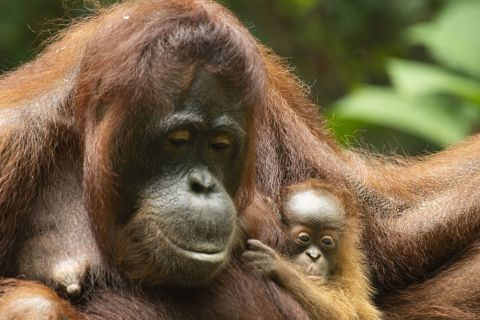
A female orangutan that had been kept chained up as a pet before being rescued, rehabilitated and released, has given birth to a baby back in her natural habitat. At the end of March 2020, in the midst of the COVID-19 pandemic, an orangutan named Susi gave birth to a female baby. This is the second baby born to a rehabilitated orangutan in Gunung Tarak protected forest which borders directly with the Gunung Palung National Park (TANAGUPA). The baby has been named “Sinar” by the Minister of the LHK (West Kalimantan Provincial Environment and Forest Service) in Indonesia.
The birth of Susi’s baby was first discovered by a team from IAR Indonesia and TANAGUPA who have been monitoring her progress in her natural habitat for the past four years. Based on the observations of veterinarians in the field, Sinar looks healthy and is feeding well from her mother. Susi is also proving to be a very affectionate and attentive mother.
Susi was previously kept as a pet in Pontianak but was rescued by the BKSDA (Natural Resources Conservation Centre) and IAR Indonesia on July 30, 2011. When she was rescued, Susi was in a very bad way. The chain which her owner had fastened around her neck many years before had caused an open, infected wound that was festering and foul smelling. Even after it had been removed, there was still rubber embedded in the skin of her neck. After undergoing five years’ rehabilitation at our Orangutan Conservation Centre in Ketapang, Susi was released in the protected forest of Gunung Tarak on May 20, 2016, a location directly adjacent to the National Park.
Dr Karmele L Sanchez, IAR Indonesia Programme Director, said: “I will never forget when we had to remove the chains from Susi’s neck. We were so very sad to see the state she was in. Now, it is very encouraging to see orangutans who used to live in confinement and suffering being able to live freely and even breeding in their natural habitat. During her treatment and rehabilitation, Susi’s condition improved, not only physically but also mentally. Susi has also proved that she can adapt and become a true wild orangutan in her new home on Gunung Tarak.”
Ir Wiratno, Director General of the KSDAE, stated: “The successful release of orangutans after rehabilitation proves the strength of cooperation between stakeholders of orangutan conservation in West Kalimantan - the Central Government, the Provincial Government of West Kalimantan, the community as well as the NGOs. Orangutans are an “umbrella” species: they play an important part in protecting an ecosystem owing to their wide range and positive impact on their local habitat by spreading seeds into forest areas. Not only that, the community around the rehabilitation site has also been heavily involved in this activity from caring for and releasing animals to monitoring them once they are back in their natural habitat.”
Alan Knight OBE, Chief Executive of International Animal Rescue, said: “The birth of this baby – the second to be born to a female orangutan rehabilitated at IAR’s centre – is testament to the success of our rehabilitation and release programme. Susi spent years in captivity – and yet she is thriving in her natural habitat and has produced a baby of her own. The Bornean orangutan is Critically Endangered and so new arrivals like Sinar – and Tarak before her – bring hope for the future and the survival of the species as a whole.
Ari Wibawanto, Head of the Gunung Palung National Park Office, said: ”The Gunung Palung National Park area, which is directly adjacent to the Gunung Tarak Protected Forest, plays an important role in the success of this programme, particularly in terms of the security of the region. TANAGUPA conservation area which has abundant orangutan food makes a large contribution to the survival of released orangutans.”
Ir H Adi Yani, Head of the Environment and Forestry Service in West Kalimantan said that the provincial government had adopted an important policy related to saving protected habitats and corridors for animals by establishing the Gunung Tarak protected forest as an Essential Ecosystem Area. “The protected forest of Gunung Tarak is a buffer zone of Gunung Palung National Park which is a large area where orangutan species live,” he explained. He added that by preserving the ecosystem of protected animals, the existing natural balance will be maintained and will eventually have a positive impact on the quality of life of the community at large.

